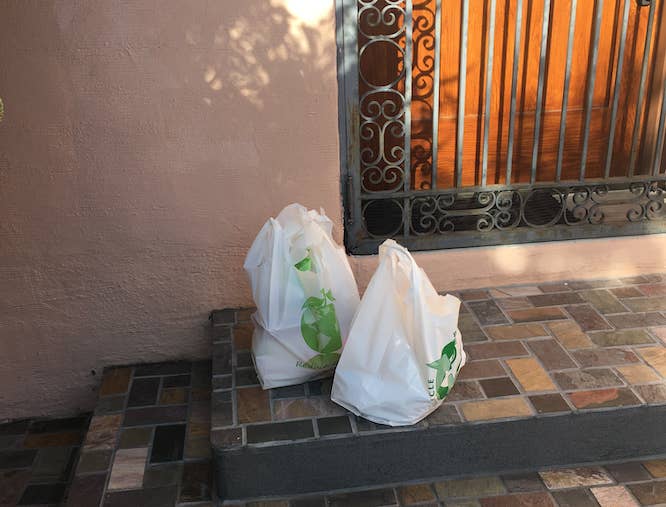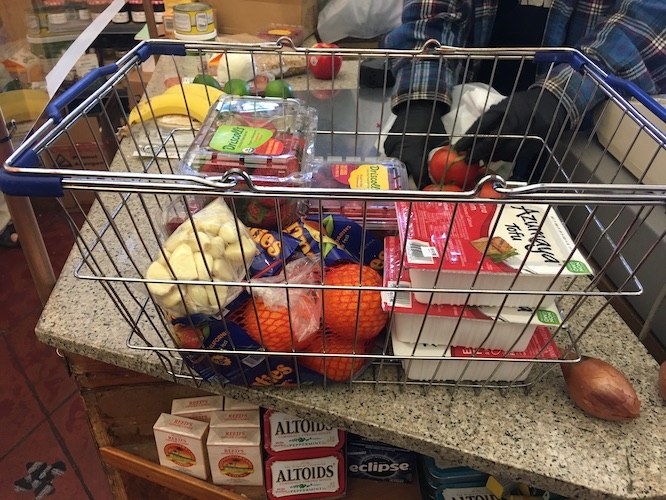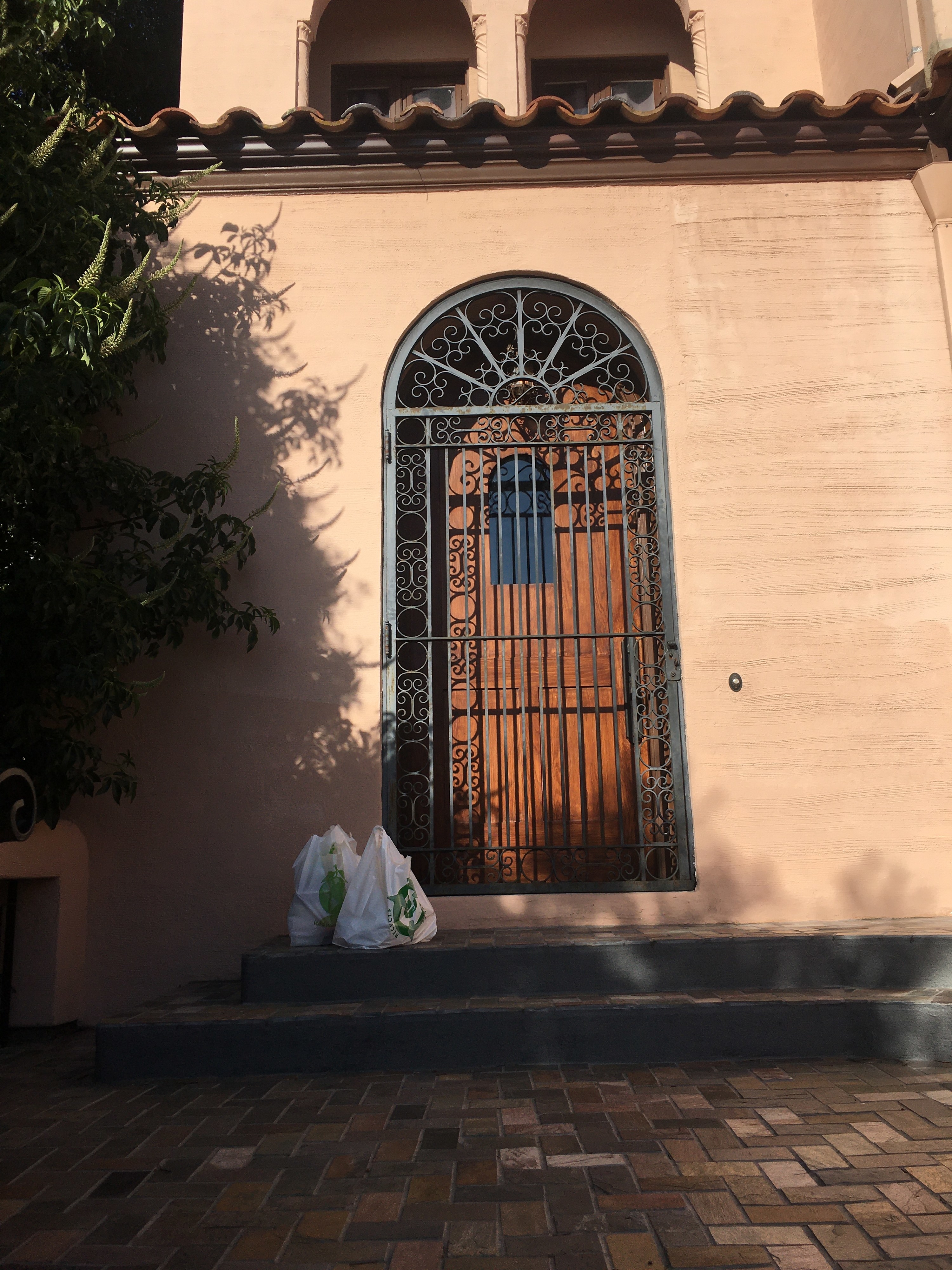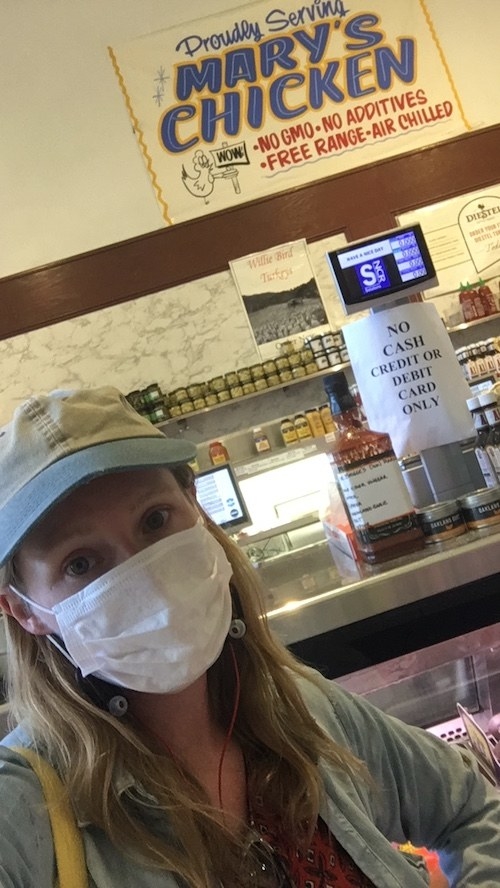
The journalists at BuzzFeed News are proud to bring you trustworthy and relevant reporting about the coronavirus. To help keep this news free, become a member and sign up for our newsletter, Outbreak Today.
Every time we go to the grocery store during quarantine, we come home too tired to cook. Staying out of everyone’s way — 6 feet away, in narrow aisles — is stressful. Wearing a mask makes it hard to see, breathe, and be heard. Buying a week’s worth of food feels like a major logistical undertaking.
For me, this is an annoyance, but it’s downright impossible for many of my older neighbors and those whose health conditions put them at a higher risk during the coronavirus pandemic.
To mitigate that risk — and to mitigate my guilt at making cocktails, playing cards, and generally having a pretty nice time in my quarantine in sunny Berkeley, California — I volunteered with my local mutual aid network to deliver groceries, prescriptions, and other necessities to those who can’t go out. I thought it would make me feel good, and it did. But the undertaking — from introducing myself to my mutual aid buddy, choosing a store, receiving her list, shopping for her items, figuring out payment, and getting the goods to her house — made me realize just how much of a headache this kind of work really is, and how much some people need it.
A few days after signing up with the Berkeley Mutual Aid Network, the organizers got in touch to say I’d been paired with a woman named Tobie. Tobie, who is 74 and has been in Berkeley for more than 50 years, lives just under a mile from me with her adult autistic son and 100-year-old mother. The health risks to her family members — not to mention herself, not to mention the 32 steps that rise to her front door from the road — made it too risky for Tobie to go out and buy her groceries at the local stores she’s been shopping at for decades.
“We’re completely shut-in and don’t venture forth,” she wrote in an introductory email, “so we’re reliant on others to do what we can’t.”
But relying on a total stranger to do your grocery shopping, she added, is not as easy as it sounds.

I’ll admit it took me a little longer than it should have to get in touch with Tobie after we were first connected. She doesn’t text, for one thing. “I have a flip phone only, (yes, I know. Not a Luddite, but there are reasons) so texting is a major undertaking,” she told me via email before describing the number of key presses it takes to say “Hi” using the T9 texting process, something I haven’t thought about in at least a decade.
For another thing, it sounded like a big job. As much as I wanted to help, I hesitated when I realized I would be the second person to help Tobie with her groceries.
“Shopping for someone else is far more difficult an endeavor than I thought,” she wrote. "It’s quite an undertaking, and then it just keeps happening. I do have another person who has done some shopping for me, but it’s too much for one person to do.”
Finally, after she sent me an email saying my silence made her anxious (“I’m not a big worrier, but these are weird times and there is more cause for concern”), I called her. She was gracious and conscientious about how much of my time she’d be taking up. She said that having someone else buy her groceries made her realize how many little decisions go into shopping; she likes underripe fruit (because she doesn’t like dripping juice), but volunteers tend to buy it at a more advanced stage. People have different ways of assessing what looks fresh, what a good deal is, what an appropriate substitution for an ingredient might be, and on and on.
“Shopping for someone else is far more difficult an endeavor than I thought."
After a chat, and after she called the store and checked to make sure her credit card would be accepted over the phone, Tobie dispatched me via email to a local butcher to buy some fish and fish parts for broth. I offered to grab her a few items from the produce market next door, and she accepted, requesting berries (four boxes, “straw, rasp, cran, blue all okay”), tofu, and mandarin oranges by the sack.
The butcher has typically taken Tobie’s order by phone and prepared it for her to pick up, but during the pandemic they’ve been so busy they’ve had to cancel that service. When I got there, I had to wait in line for about 20 minutes, a process that involved a lot of vigorous nodding in response to neighbors shouting through their masks, “Is this the line for the meat place?”
When I finally got inside, the counter attendant seemed exhausted and visibly irritated by the cheery Dean Martin–era soundtrack that made it hard for him to hear me. I explained in a muffled voice that I needed to place two orders, one for fish that would be paid for by phone and a second for a variety of meat that I would pay for by card. Eons later, after learning that it simply will not be possible to buy wild steelhead for a few more months at least and reading Tobie’s phone number out loud at least three times, I emerged with my two bags of flesh.
The butcher shop is made up of one large empty area in which customers congregate, but the produce market next door is a warren of aisles crammed with an amazing variety of products given how little square footage is in play. It’s the kind of store where it literally wouldn’t be possible to push a shopping cart, and it’s only somewhat possible to carry a handbasket without slamming it into displays and other customers. At the entrance, there was a sign that encouraged me to keep 6 feet away from other people, but in the 30 minutes I spent inside I came within 6 inches of at least a few customers, not to mention employees, some of whom were restocking shelves as I hunted for the requested items.
Mandarin oranges were easy, and berries, despite a disappointing variety, not much more difficult. But I was confounded by the tofu, which I have never purchased before in my life, and which I was not aware came in varieties beyond rectangular and white. My shopping list said two 16-ounce packages of extra-firm tofu, but locating them took rifling through many stacks of 14-ounce packages of soft tofu and 16-ounce packages of medium tofu.
When we’d spoken on the phone, Tobie had mentioned she liked this particular store because it sold very fresh peeled cloves of garlic. Just before checking out, my eyes alighted on a stack of plastic bags of the very same. I hadn’t seen anything about garlic on the list, but I felt an impulse to buy it anyway. At the register, when an available phone handset was located, the cashier called Tobie to get her credit card information once again, and I considered asking them to ask her whether she wanted the garlic or not. If she paid for it and didn’t want it, I would feel bad. But I was also distracted by the need to communicate to the people bagging the groceries through my mask from a distance of 6 feet how to keep her groceries separate from my groceries — and by the time that was figured out, the phone call was over.
Fifteen minutes later, after my fiancé drove me over to Tobie’s house, she confirmed that she had, in fact, wanted the garlic. A triumph.
Doing someone’s grocery shopping is a form of care work. I’ve never done that kind of work before, though I have worked in the service industry and covered workers at places like Amazon and Instacart for years. It felt intimate, in part because I was helping someone who couldn't easily fend for herself. It required patience, kindness, and good listening skills — which are not my forte. I was proud of myself.
It wasn’t until a few days later that I learned, via email, that all the fish I ordered was weighed wrong and that not only had the garlic been on Tobie’s list the whole time, she actually asked for three bags of it.
I guess I shouldn’t quit my day job.

Many people who’ve signed up to receive delivery via mutual aid networks during the coronavirus pandemic have done so because commercial services like Instacart, Amazon Fresh, and Shipt are expensive and in high demand. Delivery times in some cities can be days away, and delivery slots so hard to come by that someone wrote a computer script to help people grab them faster. While some take issue with the cost or hassle, for others it’s ethics — drivers who deliver for these apps, often precarious gig workers, have called for boycotts over a lack of personal protective gear and hazard pay.
To fill that gap, volunteers have stepped in. In addition to the one in Berkeley, there are mutual aid networks in Seattle, in Brooklyn, in Madison, Wisconsin, and other US cities. A friend who volunteered with mutual aid in one of the hardest-hit areas of the pandemic in the US said she’s found doing big shopping trips for multiple elderly neighbors, some of whom are sick with COVID-19, relatively manageable, even if they do have highly specific requests that require going to multiple stores.
Jordon Wade is a member of Mutual Aid Medford and Somerville in Massachusetts, where hundreds of volunteers have signed up to deliver groceries. The Somerville mutual aid network maintains a Slack channel where volunteers discuss which stores are less crowded or better stocked. “It is logistically difficult,” he said. “I’ll go to the grocery store and it says ‘limit one dozen eggs.’ Well, if both people want eggs, that could be a problem.”
Wade told me he’s gone to the grocery store with two, three, and even four separate lists to shop. “I’m an organized person. I just finished a PhD.,” he said, “but keeping four going at once was difficult.”
Do you have questions you want answered? You can always get in touch. And if you're someone who is seeing the impact of this firsthand, we’d also love to hear from you (you can reach out to us via one of our tip line channels).
A friend of mine who signed up for a mutual aid network in her neighborhood told me she spent 30 minutes looking for a special brand of snack for her mutual aid buddy one week, only to be dumped the following week after being accused of sneaking unordered items into the cart to take home gratis.
“It’s something I have a really hard time articulating to people who haven’t tried it before."
Accusations of stolen groceries, inaccurate bills, or too expensive substitutions are complaints Instacart shoppers deal with all the time. Vanessa Bain, a shopper who’s been delivering groceries to Instacart customers — and advocating for better treatment of its workforce — since 2016, said most people don’t appreciate just how complicated her job is.
“It’s something I have a really hard time articulating to people who haven’t tried it before, how much of a skilled job it actually is,” she said. “There’s a whole psychological evaluation that you kind of have to apply by taking their grocery list and looking at how things are prioritized. Are they someone who eats largely organic? Or someone who eats a mix of conventional and organic things? Are they someone with food sensitivities or allergies?” she said. “It’s a skill that you hone and refine over time.”
Instacart turned a profit for the first time in its eight-year history earlier this week. Like Amazon, the company’s bottom line has benefitted from the fact that millions of Americans are avoiding brick-and-mortar stores during the pandemic. Instacart has also announced plans to bring on more than half a million new delivery workers to fill the increased demand. While those jobs will be low-paying independent contractor gigs, they likely won’t be hard to fill given the record unemployment rate.
“Instacart has treated this like their own personal Super Bowl. ‘It’s busier than ever. Great, let’s hire a bunch of people!’” said Bain.
But while the company’s been raking it in, Bain said workers aren't making any more money than usual, despite high demand, because of all the new hires. Today, some of them are refusing to work; they’re protesting the low wages and the dangers of working on the front lines of a pandemic as part of a May Day general strike. They’re being joined by workers at Shipt, Target, Amazon, FedEx, and Whole Foods who say they’re seeking not just better protections during the outbreak but a permanent improvement in benefits and pay that reflects how essential the virus has proven their roles to be.
A spokesperson for Instacart said the company “has an unwavering commitment to safely serve shoppers during this critical time.” She also said the more than 500,000 people currently signed up to work on the platform “are earning 60% more on every batch, which includes higher payments from Instacart and nearly double the tips from customers.”
Bain said she’s hopeful that the attention generated by the pandemic will encourage the California government to enforce AB5, a law that gives Instacart and other gig workers the same protections as regular employees.“The pandemic is highlighting all these problems activist have been screaming into a void about forever,” she said
Wade, the Massachusetts-based volunteer, said the pandemic has made him more aware of the situation people like Bain are in.“I hope that we have a little bit more appreciation for them in the future,” he said. “They’re grossly underpaid as it is, even without risking life and limb. Unquestionably it is skilled labor.”
“I cannot even fathom doing that eight or ten hours a day,” he added.

I hadn’t heard from Tobie since the garlic debacle, but, having had about a week to recover since my last experience inside a grocery store, I reached out to her to see how she was doing. She said she remains hypervigilant, waiting a day before touching any deliveries that can’t be frozen and soaking all her produce in soapy water. She’s sent me another list yesterday, and I plan to shop for it — after reading it carefully — today.
The Bay Area shelter-in-place order was extended through the end of May, and it's logical to think that when it comes to an end, my relationship with Tobie will, too. I’ll go back to work, to the gym, to bars, to normal.
But for Tobie, the conditions that cause her to require a helper — being the sole caregiver, at 74, for a centenarian and for her son in a house with at least 32 steps up and down — aren’t going to change just because the order is lifted. Normal was never easy for Tobie, and the same is true of many of those on the front lines of the pandemic. Many essential workers who’ve been held up as heroes say they don’t want to go back to normal; now that the vitality of their labor has been widely acknowledged, they hope the post-quarantine future will be one with higher pay, better benefits, and more security.
While we struggle to figure that out, Tobie is struggling to figure out how to be an ethical receiver of aid. Like everyone, her family has certain needs, desires, and preferences when it comes to their diet — she eschews corporate produce from Del Monte (“horrible global villains”) and has a preference for certain Asian vegetables left over from her days as a professional cook.
“I was just thinking about the complications of having someone else do your shopping for you. It has so many levels of complexity,” she wrote in her most recent email. “I love to cook. Will a volunteer know how to select the right bunch of gai lan? Recognize the vegetables I routinely purchase that may be completely inscrutable to them? Do I want to annoy the generous warm hearted volunteer with my picky little preferences? Do I have that right?”
